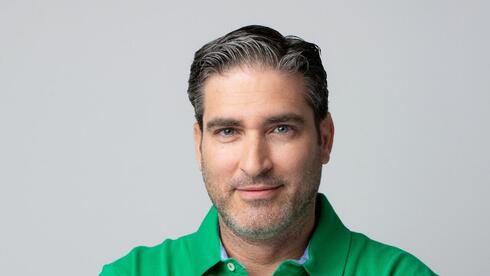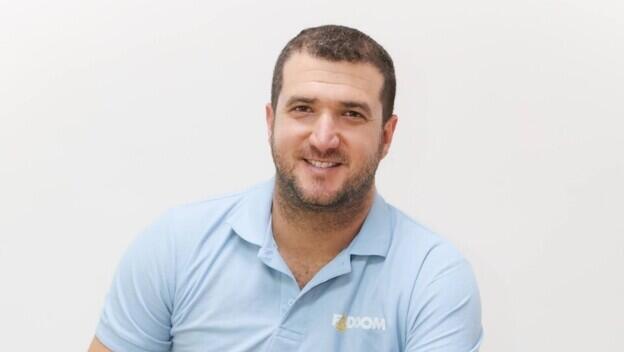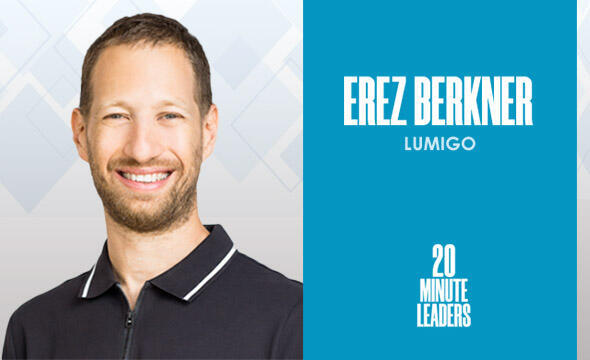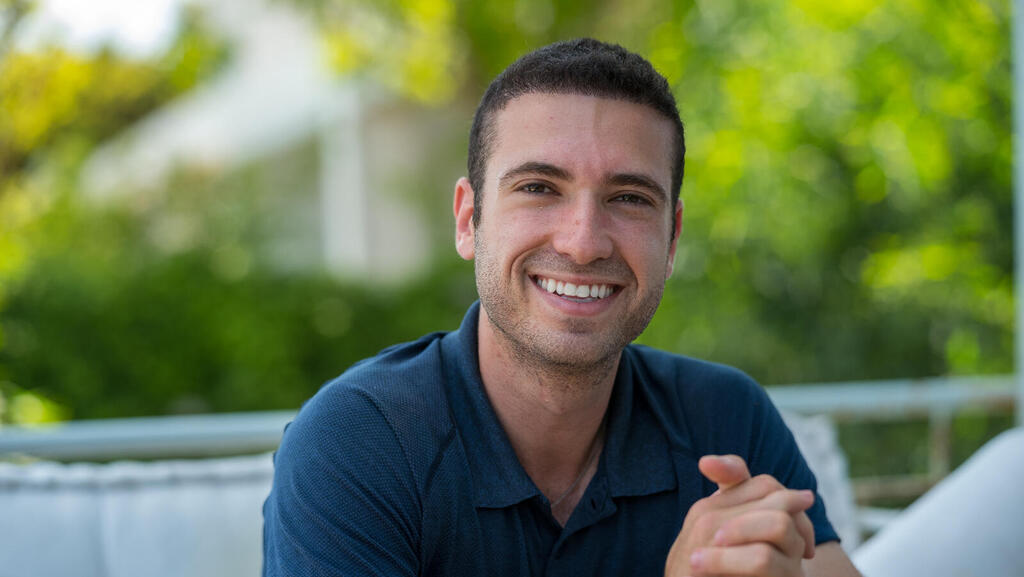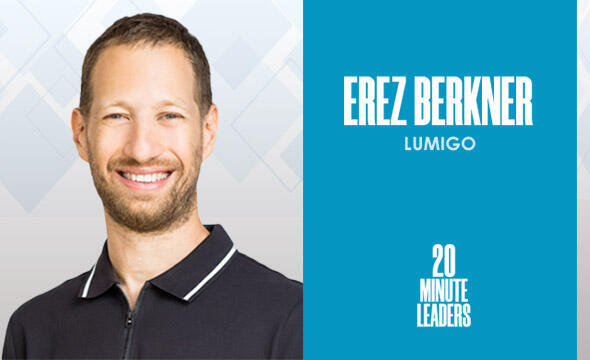
20-Minute Leaders
“There is a new architecture being built that's going to shake the cloud.”
Being part of the next revolution in the cloud excites Erez Berkner, CEO and co-founder of Lumigo.
Being part of the next revolution in the cloud excites Erez Berkner, CEO and co-founder of Lumigo. He shares that it is very meaningful to enable the transformation to cloud 2.0 by monitoring and debugging cloud applications for customers. Berkner has been a developer since he was young, and he rose to managing Check Point’s security product, which he explains put him in a great position to see the upcoming revolution. He shares that he had wanted to start his own company, but he was waiting for the right time and right problem. When he saw the opportunity in the new cloud technologies, he knew it was the right time to leave everything and dive in. Berkner explains that it was difficult to abandon his structure and frameworks and start from nothing. But he has built a company that he believes will help organizations to innovate faster, transforming the world.
I'm excited to hear about the way you perceive the world and how Lumigo enters your own life story.
We are going through a transformation now. We are now in the stage of moving from cloud 1.0 to cloud 2.0. Essentially, all the new technologies in the cloud. It's containers, Kubernetes, serverless, and microservices. All those buzzwords that you keep hearing in the last couple of years, they really come together and form a new framework and on top of that developers are building the next generation of the cloud. That brings new challenges. Lumigo is focused on allowing the developers to run those applications with confidence, making sure that when something goes wrong, they will know about it and be able to fix it.
I'm a developer. I learned very early. I was programming before it was cool. I ended up in Check Point as a developer, after the special unit in the IDF. Throughout my years at Check Point, I learned about the cloud and I really got excited about that transformation. That's really what brought me to dive deeper about how the future of software is going to look like.
What led you to have that insatiable curiosity that you are describing here?
Throughout my career, I always aspire to be involved with the latest technologies. It’s always the cutting edge technology that excites me. That curiosity got me to get deeper and manage more of the business that has to do with those technologies. I was managing the Check Point cloud security product in late 2015, and from that position I was able to see things that I couldn't have seen just as a developer. It gave me a unique view of where the world is heading to maybe two or three years before the average developer can see that. That's really what you need, to be at the right spot to be able to see a bit further away and to identify those once-in-a-decade revolutions. That's a great place to start a business.
Were you actively looking at different ideas for startups or was this something that you came across and said, “This is an opportunity for me to start a company"?
It's actually a bit of both. I think 50% of developers in the last 10 years are thinking about opening a startup, in Israel, at least. But there is a big step to take this to the next level. It was always there waiting for the right time, the right problem. Then came serverless and containers and all the modern cloud, and it really got me excited. That gave me the confidence for the first time in my life to say, "I'm going all in." I left everything aside and just jumped into this pool.
How did you strategize through the first steps of building such a company?
First of all, it's really hard. You stop doing what you are doing, and you have probably been good at what you are doing, and all of a sudden you are alone. There is no structure. There is no framework. That nothingness is really hard because you need to decide where you go.
What did you know in this whole emptiness of nothingness?
The way I thought about it was because it's so empty, let's get back to basics. There is a revolution. There is a new architecture being built that's going to shake the cloud. As long as I'm going to stick to this revolution, and I'm going to spend my time over there, then there are going to be so many opportunities in that. That's the basics: “I don't know if that's the exact idea, but I know that that's a domain I want to double down on.”
Take me back now back to the thesis that you came up with on the way the developers are interacting with their serverless applications and machines.
I'm coming from 14 years at Check Point, so I'm a security expert, so it only makes sense: a serverless meets security startup. This is where we actually started in the first early days.
I think one of the things that we knew was that we had no validation. We strove to get as fast as possible early-stage validation. We went to 40 organizations before writing a line of code. We created a presentation of this mock up, and we told them, "You have serverless. Here's an idea. Is that a problem that you want to solve? Would you pay for this?" We learned very quickly that nobody out of those 40, maybe one, really cared. But most of them told us, "We are at an early stage. If you can do something to help us build and have confidence to run it in production, that is a game changer." This basically shifted us toward monitoring and debugging.
How do you identify the pain points that you are going to solve and how you are creating differentiation amongst competitors?
We were very early-stage to a drastically radical new technology. We knew that the incumbents, it will take them a long time to get up to speed. At the same time, we found a problem: monitoring, debugging. We knew that that's a domain that if we can help them, they will pay for it. It provides them value.
It literally stops them from being able to innovate and to iterate, right?
Exactly. If there is a problem, that's critical. Two hours of downtime, that can be millions of dollars. That's where we actually drilled down. We came back to those 40 companies and said, "Okay, we got you. This is what we want to do."
What is the role of Lumigo in the world today?
The world is changing. People are adopting the cloud 2.0 with the new technologies. Throughout the years, there was always an ecosystem going with every server, every cloud that you have. So Lumigo is going to be the monitoring tool of choice for all the new cloud architecture. All the modern startups and organizations are going to choose because Lumigo is the best upgrade.
I know why it's important. But why do you care so much that you wake up every day leading this ship and telling that narrative?
One, the new technologies excite me. And understanding that we can create something that can impact the next revolution in the cloud, that's meaningful. The last point is very personal. This is something that I have a piece in: it's mine. So if I'm going to fail, if I'm going to succeed, it’s a very personal experience.
Part of what excites me about companies like Lumigo is that if Lumigo does its work properly and makes a positive impact on organizations, this allows the organizations to increase the rate of innovation.
Today, it's broken. The top challenges for the new cloud are debugging, monitoring, and observability. If we can take those away, we are on the highway for fast adoption by the entire world of the modern technologies and faster pace of development and innovation.
I've been working on cloud applications for the last 10 years. Why are we still in 2022 and it's such a pressing problem that you are describing today?
It has to do with maybe the human factor and the human economy. Because you can see trends of technology; it's very rare that something goes away, especially fast. Even the cloud is about 10 to 20% of the overall servers of the world. You feel like everybody is in the cloud. But you have industries that are legacy industries, things that work. It takes time for things to adopt.
Michael Matias, Forbes 30 Under 30, is a Venture Fellow at Innovation Endeavors as well as investment Venture Partner at Secret Chord and J-Ventures. He studies Artificial Intelligence and Human-Computer Interaction at Stanford University, and was an engineer at Hippo Insurance. Matias previously served as an officer in the 8200 unit. 20MinuteLeaders is a tech entrepreneurship interview series featuring one-on-one interviews with fascinating founders, innovators and thought leaders sharing their journeys and experiences.
Contributing editors: Michael Matias, Megan Ryan



